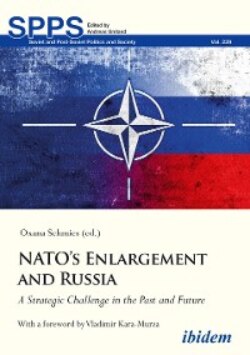Оглавление
Группа авторов. NATO’s Enlargement and Russia
Foreword. A Europe “Whole and Free” Will Not Be Possible Without Russia
Note by the Series Editor
Introduction
The Messages
Constellations of Today and Tomorrow
Past and Present
The Contributions
Acknowledgements
Nuclear Deterrence. A Guarantee or Threat to Strategic Stability?1
The Genesis of Nuclear Deterrence
The Birth of the Concept of Strategic Stability
Modern Nuclear Doctrines
The Dichotomy of Nuclear Deterrence
The Collapse of Nuclear Arms Control
Renewing Strategic Stability and Arms Control
50 Years Ago: Kennedy, Brandt, Nixon. A Model for 21st Century Statecraft?
Erosion of the Cold War Coalition
Back to the Future?
A Model for Today?
Rebuilding Alliances
An Opportunity for Europe
The Importance of a European Return to NATO
Towards a Global Atlantic
An Agreement with No Name
Understanding Atlantic Alchemy
As Important as the Cold War
The Art of Under Promising
A Path, Not a Destination
Testing the Water in Berlin
Slow Start
Brandt’s New Narrative
A New Generation Takes the Stage
Small Steps on a Global Scale
Speeding Things Up
Quick Course in Diplomacy
A Flaw in the Text
Joint Strategic Vision
Lessons for the Future
A “Great Prize,” But Not the Main Prize. British Internal Deliberations on Not-Losing Russia, 1993–1995
A “Stable, Democratic and Cooperative Russia”—but “Cost Effectively”
Losing Russia Would Be Bad, but One Should “Prepare for Failure”
Little Influence over “a Source of Instability and Trouble”
Conclusion
The Clinton Administration and Reshaping Europe
The Cold War Comes to an End
Track I: Engage, then Enlarge
Track II: A Relationship with Russia
Track III: A Partnership with Ukraine
The Tracks Come Together in 1997
Outcomes
Was It Worth It?
Central European Security and Russia
Threat Perceptions and the Russia Factor in Central Europe. Historical Threat Perceptions
Threat Perceptions between 1989–2014
Threat Perceptions after 2014
The Russian Factor and Security and Defense Policies in Central Europe
Conclusion: Between Balancing and Neutrality
The Ukraine Conflict. Lessons for NATO, Kyiv and Their Future Relations
“Geopolitical” Interpretations
A Divided Public
NATO-Ukraine Relations
Lessons for NATO
Damage Control. The Breach of the Budapest Memorandum and the Nuclear Non-Proliferation Regime
Russia’s Violation and Western Response
Ukraine’s Territorial Integrity and the NPT
The Budapest Memorandum and the NPT
The Non-Proliferation Regime’s Uncertain Future
Lost and Real Chances in Western-Ukrainian-Russian Relations. An Interview. Pavlo Klimkin
Strategic Decentering. Moscow’s Ideological Rhetoric and its Strategic Unconscious, 2012–2020
Balancing on the Brink of War—or Not?
The Collapse of Containment
Tactics of Postponed Escalation
To Whom Are the Escalations Being Addressed?
Demonic Plan or Newsbreaks?
Global Media in Russia’s Strategy
Flank Doctrine of Escalations
Creation of Uncertainty
Flank Unassailability
Safe Hacking
Projection of Influence Instead of Territorial Expansion
Creation of Enemies
Temporary Satellites
A Partner is a Resource Appendage
Neopopulism as a Coalition Against the Law-Governed World
The Abnormal Gold Standard of Behavior and Strange Allies
Hot Spots
Privatization of Decisions on the State of the World Order
Ill-Defined Financing of Strategic Projects
Grounds for Impunity
Punishment as a Mistake
2020: The Fall of Fame
A Crack in the Strategy
Foundations of Current and Future Security Relations Between Russia and NATO Member States. Narratives, Capabilities, Perceptions and Misperceptions
Russia in Western Narratives
Evolution of the Russia-NATO Military Balance
Russian Degradation, NATO Disarmament
NATO Enlargement, Russian Panic
Russian Resurgence, NATO Panic
Regional (Im)balances
Distorted Messages
The Way Forward
Cooperation vs. Confrontation. German-Russian Security Relations Between Geopolitical Poles
On the Misperception of Russia’s Foreign and Security Policies
Russian Military Policy and Moscow’s Approach Towards the West
Russian Threat Perception
The Main Points of the Basic Documents
Conclusions for the Russian Armed Forces
Internal Power Structure
Conclusions for German Policy
Concluding Remarks
